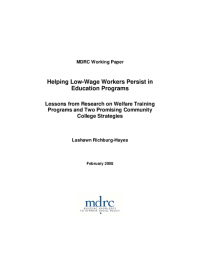Helping Low-Wage Workers Persist in Education Programs
Lessons from Research on Welfare Training Programs and Two Promising Community College Strategies
This working paper was originally prepared for a conference, “Strategies for Improving the Economic Mobility of Workers,” sponsored by the Federal Reserve Bank of Chicago, November 15-16, 2007.
Employment has long been held to be an important deterrent against poverty, and work is a core component of a range of federal efforts to improve the economic well-being of low-income families. However, recent trends in earnings and research both confirm that work alone is not sufficient to prevent poverty. While there is compelling evidence that additional years of schooling and advanced education credentials are associated with higher earnings, evaluations of education and basic skills training programs have yielded mixed results concerning their ability to increase earnings among low-income populations. This working paper summarizes what is known from evaluations about the effectiveness of education acquisition to advance the earnings and careers of low-wage workers. The working paper then discusses two popular community college strategies intended to increase academic success among this population: enhanced student services and performance-based scholarships. Recent research about performance-based scholarships suggests that they can have a large, positive effect on academic achievement among a predominately female, single-parent student population that faces multiple barriers to completing college.






